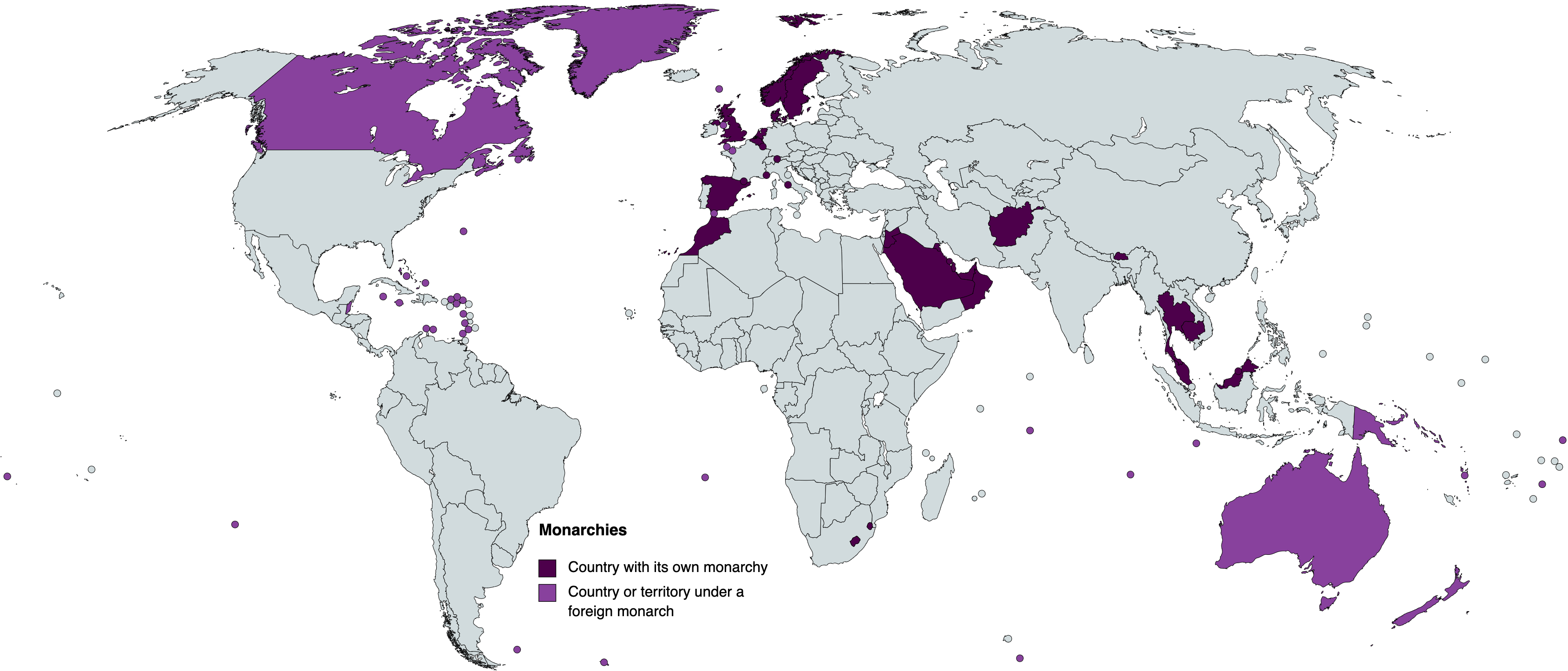More languages
More actions

Monarchism is a system of governance characterized by permanent heads of state and familial power. In monarchist political theory, which focuses heavily on legitimacy as does liberal political theory, monarchism derives its legitimacy from its monarch. In Marxist theory, monarchy is always understood relative to democracy, as is feudalism understood relative to capitalism. The main distinction between the two, apart from that one comes before the other, is the place that the constitution holds. In monarchism the constitution subsumes the people, whereas in democracy the people subsume the constitution, or as Marx states: " In monarchy we have the people of the constitution, in democracy the constitution of the people."[1]
Monarchism was the most common system of governance until the 20th century, by which time the economic modes of production had begun to develop across the world. Republics have now replaced many monarchies, yet today 43 countries still have a monarch. Monarchies were amongst the main enemies of early socialist movements such as the Russian monarchy of Nicholas Romanov, and the Chinese monarchy.
Democracy is the truth of monarchy, monarchy is not the truth of democracy
— Karl Marx, Critique of Hegel's Philosophy of Right, 1843
Types of monarchist systems
Monarchy can be divided into two types: absolute monarchy and constitutional monarchy.
Absolute monarchy
Lenin stated that absolute monarchy was desired most by the police and government officials. It consists of an absolute monarch, a council of officials appointed by that monarch, and sometimes a lower house of popularly elected officials for consultation. The significance of the system is that the police and officials have complete power, and the bourgeoisie have a consultative voice with the government. The purpose of this systems is such that the police and officials can live luxuriously, and that the rich can rob the poor in effect.[2]
Constitutional monarchy
Constitutional monarchy develops only through violent struggle, and by first passing through a republican stage.[3]
According to Lenin, this type is desired by the most liberal of the bourgeois. It consists of a constitutional monarch, an upper house of popularly elected officials, as well as a similarly popular lower house. The significance of this system is that the power is split into thirds, one third being the police and officials, one third the bourgeoisie, and one third the rest of the people. The purpose of this system is to place capitalists into a position of power, to make the police and officials dependent upon them, and to allow them to rob the poor by right.[2]
Citations
- ↑ “Democracy is the truth of monarchy, monarchy is not the truth of democracy. Monarchy is necessarily democracy in contradiction with itself, whereas the monarchial moment is no contradiction within democracy. Monarchy cannot, while democracy can be understood in terms of itself In democracy none of the moments obtains a significance other than what befits it. Each is really only a moment of the whole Demos. In monarchy one part determines the character of the whole; the entire constitution must be modified according to the immutable head. Democracy is the generic constitution; monarchy is a species, and indeed a poor one. Democracy is content and form; monarchy should be only form, but it adulterates the content.
In monarchy the whole, the people, is subsumed under one of its modes of existence,. the political constitution; in democracy the constitution itself appears only as one determination, and indeed as the self-determination of the people. In monarchy we have the people of the constitution, in democracy the constitution of the people. Democracy is the resolved mystery of all constitutions. Here the constitution not only in itself, according to essence, but according to existence and actuality is returned to its real ground, actual man, the actual people, and established as its own work. The constitution appears as what it is, the free product of men. One could say that this also applies in a certain respect to constitutional monarchy; only the specific difference of democracy is that here the constitution is in general only one moment of the people's existence, that is to say the political constitution does not form the state for itself.”
Karl Marx (1843). Notes for a Critique of Hegel's Philosophy of Right. [MIA] - ↑ 2.0 2.1 Vladimir Lenin (1905). Three Constitutions or Three Systems of Government. [MIA]
- ↑ “Although M. Guizot never loses sight of the French Revolution, he does not even reach the simple conclusion that the transition from an absolute to a constitutional monarchy can take place only after violent struggles and passing through a republican stage, and that even then the old dynasty, having become useless, must make way for a usurpatory side line.”
Karl Marx and Friedrich Engels (1850). England’s 17th Century Revolution. [MIA]
